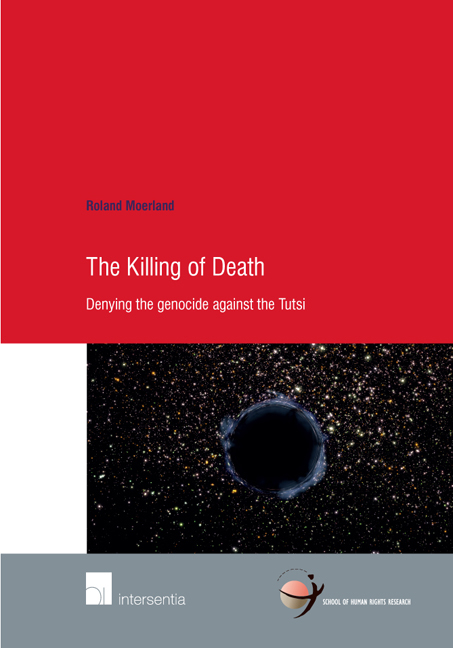Book contents
- Frontmatter
- Dedication
- Preface
- Contents
- List of abbreviations
- Table of figures
- Introduction
- Chapter 1 Setting the scene
- Part I Exploration
- Part II Inspection
- Part III Reflection
- Chronological overview of significant interviews, consultations and events
- Selected bibliography
- Curriculum vitae
- School of Human Rights Research Series
Chapter 1 - Setting the scene
from Introduction
Published online by Cambridge University Press: 21 September 2018
- Frontmatter
- Dedication
- Preface
- Contents
- List of abbreviations
- Table of figures
- Introduction
- Chapter 1 Setting the scene
- Part I Exploration
- Part II Inspection
- Part III Reflection
- Chronological overview of significant interviews, consultations and events
- Selected bibliography
- Curriculum vitae
- School of Human Rights Research Series
Summary
Introduction
This study deals with the phenomenon of genocide denialism and it more particularly addresses how genocide denialism operates in the context of the genocide against the Tutsi. Genocide denialism denotes that we are not dealing with a single act or type of denial but with a more elaborate process of denial that involves a variety of denialist and denial-like acts which all play a role throughout the process of genocide. The topic of this study was mainly inspired by two lacunae. The first is a substantial lacuna which entails the general lack of research on the aftermath of the genocide against the Tutsi and more particularly the neglect of the denial of the genocide. The second is a disciplinary lacuna which includes the failure of criminology to study genocide and its denial. These two lacunae have greatly determined the flow and content of this study, shaping the research questions and the approach taken to answer them. The second part of this Chapter will address the abovementioned lacunae and discuss the ramifications of these two “voids”, thereby illustrating the theoretical and social relevance of this study. The third part of this Chapter will continue to present a detailed outline of this study which will also introduce the research questions posed. The discussion of the research questions will be followed by a brief elaboration on how the fieldwork and data collection for this study were conducted. Lastly, some issues concerning the scope of this study are addressed. This Chapter will, however, start by introducing the topic of the denial of the genocide against the Tutsi, which is the focus of this study.
‘I am not one of those who deny the genocide of the Tutsis.’
On the 1st of May 1998, Jean Kambanda became the first head of state in history to plead guilty to the international crime of genocide. Kambanda had been the Prime Minister of Rwanda at the height of the genocide against the Tutsi and he pleaded guilty to multiple charges including genocide, conspiracy to commit genocide, incitement to genocide, and complicity in genocide. At a specially convened session of the International Criminal Tribunal for Rwanda (ICTR) in Arusha (Tanzania), Kambanda made clear that he had understood the charges being brought against him and that he had entered his plea knowingly and voluntarily.
- Type
- Chapter
- Information
- The Killing of DeathDenying the genocide against the Tutsi Roland Moerland, pp. 3 - 42Publisher: IntersentiaPrint publication year: 2016



